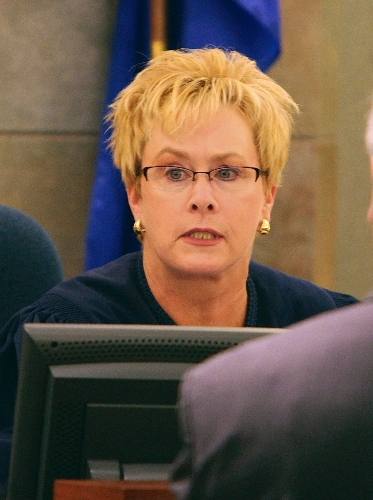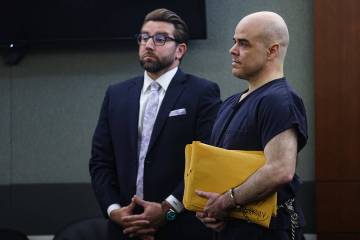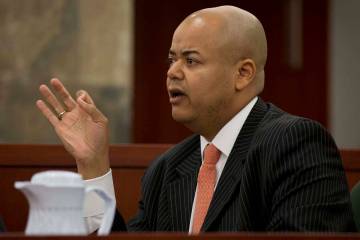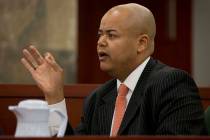Judging the Judges: Lawyers give ‘F’ to three Clark County judges on report card
A majority of lawyers evaluating performances by Clark County District Court judges have said that three of the jurists should no longer serve on the bench.
Judges Kathy Hardcastle, Michelle Leavitt and Jessie Walsh should not be re-elected, said those attorneys, who rated each district judge in the Las Vegas Review-Journal's Judicial Performance Evaluation. In addition, the lawyers gave failing marks to former Judge Jackie Glass, who stepped down from District Court shortly before the survey.
To varying degrees, a majority of lawyers were satisfied with other District Court judges. Eighteen of the 32 district judges received retention recommendations from at least 80 percent of the lawyers who rated them.
In all, 872 attorneys voluntarily answered survey questions, representing 19 percent of the 4,624 active, licensed lawyers in Clark County who were invited to participate. Those responding pledged to rate only those judges with whom they have had sufficient and fairly recent experience.
Attorneys also rated the Nevada Supreme Court, the Clark County Family Court, and municipal judges and justices of the peace in Las Vegas, Henderson and North Las Vegas. Stories about those results will be published today and Monday, and complete results will be posted on reviewjournal.com.
All four judges who received do-not-retain recommendations either declined or did not respond to requests for interviews about the survey.
Walsh fared the worst in the survey, with almost two-thirds of 337 attorneys evaluating her saying she should not be retained if she stands for re-election in 2014.
Walsh presided over the trial that awarded a half-billion dollars in punitive damages against a pharmaceutical company that provided the anesthetic improperly used by a Las Vegas clinic, leading to an outbreak of hepatitis. In remarks explaining their scores, some lawyers cited the case in describing Walsh as consistently favoring certain plaintiff attorneys.
"It is no coincidence that the two largest verdicts in Nevada have happened in her courtroom," wrote one lawyer.
Lawyers were asked to rate each judge "More than adequate," "Adequate," or "Less than adequate" on 12 characteristics.
More than half the lawyers who rated Walsh considered her "less than adequate" on the four traits most closely related to judicial competence: being familiar with the cases in her court and considering arguments before ruling; making appropriate rulings; properly applying the law and rules of procedure and evidence; and clearly explaining her decisions.
She was also rated less than adequate on freedom from bias toward parties appearing in her court.
Almost 60 percent of 339 attorneys evaluating Leavitt oppose her retention. She was judged less than adequate on two of the four core questions: appropriate rulings and proper application of the law.
Half called her less than adequate on familiarity with the case and weighing evidence before deciding, while 49 percent called her less than adequate in explaining decisions.
"Judge Leavitt does not get it," one lawyer wrote, adding, "She doesn't see the big picture and seems incapable of rendering a coherent decision based on the law and the facts. Going before her is a total crap shoot."
Hardcastle would not be retained by 58 percent of the 205 lawyers who evaluated her. But unlike Walsh and Leavitt, a slight majority of lawyers rated her adequate or more than adequate on the core competency questions. Her worst scores (48 percent less than adequate) were on appropriate rulings, applying law and rules, and courtesy. One lawyer wrote that while Hardcastle previously excelled in the administrative role of chief judge, she seems less effective since returning to the trial bench.
Glass had similar scores, with 56 percent of 134 lawyers opposed to her retention. Nearly half called her less than adequate on appropriate rulings, proper application of law and courtesy. She recently stepped down to take a quasi-judicial role in a TV court program.
The 277 attorneys who evaluated Judge Valorie Vega split on her retention, as she dropped from 65 percent favorable in a 2010 survey to 50 percent now.
Vega blames the drop mostly on allegations by KLAS-TV, Channel 8, that she had the jury deliberate all night in a December 2010 murder trial because she had vacation scheduled to start the next day.
Vega said the TV reporters ignored essential facts: The jury twice declined her offer to break for the night, and no courtroom was available the following day for the trial that had stretched from four weeks to six.
"It was a situation with no good options," Vega said. "If I didn't get that trial completed, I was going to have to bring those jurors back in February and cross my fingers that none of them got sick or transferred to jobs out of state."
An earlier trial had ended in a hung jury, so losing jurors could have forced the case into a third. And the defendant had already been in jail two years.
The jury stayed, and at 7 a.m. on Dec. 17, 2010, they announced a verdict: not guilty.
Vega's scores on time management and productivity soured from 29 percent less than adequate in 2010 to 40 percent in 2011. But several lawyers defended her work ethic.
"Judge Vega is one of the hardest working judges on the bench," wrote one.
Vega is married to Howard Stutz, a business reporter for the Review-Journal.
The 254 lawyers who evaluated Judge Stephany A. Miley also gave her a weak retention recommendation: 52 percent. Still, it was better than her 42 percent score in the 2010 survey.
Her worst scores came on traits of judicial competence: being familiar with the case and its documents; considering all facets before making a decision; ruling appropriately, applying the law and rules properly, and explaining those decisions. More than 40 percent of the lawyers called her less than adequate on each of those issues. Miley had "more than adequate" ratings exceeding 40 percent, however, on courtesy and most questions regarding freedom from bias.
Anonymous comments from the lawyers tended to the negative, such as: "She has been a disaster ever since she took the bench and will not improve. She is the poster child for judicial appointments."
But a fan wrote: "Judge Miley gets a bum rap. As a defense attorney I have found her to be more than fair. Very well prepared and accommodating for all who enter her courtroom."
Miley declined an interview request.
Jerome T. Tao is the only District Court judge evaluated who will face election this year. Appointed in January 2011, he achieved a retention recommendation of 80 percent from the 163 lawyers who evaluated him, better than many of his colleagues.
A majority rated him more than adequate on every judicial trait; more than 60 percent on courtesy, case preparation, and freedom from bias and impropriety.
His poorest scores were 20 percent less than adequate on properly applying law and rules, and 19 percent on appropriate rulings.
Several lawyers mentioned such shortcomings in written comments, but didn't cite particulars. Examples were, "I feel like Judge Tao isn't that familiar with the ins and outs of civil law yet," and, "All over the map on his criminal rulings."
Tao said he wished the comments "were more specific so I could use them to improve." With such general comments, he said, he can't tell what specific aspects of the law the evaluators are suggesting he learn better.
"There were a couple of other kinds of comments I might be able to do something about," Tao added. "One was that the calendar is a little slow, and one said I overanalyze things. Since those comments were consistent, I will look at it and see whether I can do something about it."
Another District Court judge, Carolyn Ellsworth, faces voters in 2012, but was not rated in the 2011 poll because she only took office in October, and lawyers could not see enough of her judicial performance in time to fairly evaluate it. Ellsworth was appointed to the vacancy created by Glass' departure for a TV career, while Tao filled the term of Judge David Wall, who left the bench for private practice.
The best scores on the District Court were given to Judge David Barker, who was appointed to the bench in 2007 and re-elected without opposition in 2008. He will face voters again in 2014.
Of the 275 lawyers who rated Barker, 94 percent recommended that voters retain him. At least 68 percent of the lawyers rated him more than adequate on every judicial trait.
Barker moved to Las Vegas in 1984 to intern under U.S. Attorney Lamond Mills. Except for a short detour into private practice in 1991, he spent the next 23 years as a deputy under four Clark County district attorneys.
Barker said he sought judicial appointment because "I had been in the courts a lot of years and thought I could do a good job."
Former deputy district attorneys who become judges don't always get excellent scores from lawyers. Barker wouldn't theorize about that, saying it would be inappropriate to comment on other judges.
"I try to be respectful of (the lawyers') time, and require all to be respectful of one another," he said. "I value efficiency and courtesy."
The lawyers seemed to agree with his approach, scoring him above 80 percent on being punctual in convening court, keeping business moving and work completed.
"Judge Barker expects a lot in his courtroom, and it appears that most attorneys raise their game in response," one lawyer wrote. "That probably would not happen were it not obvious that Judge Barker is giving the effort he expects others to give."
Judging the Judges - 2011































